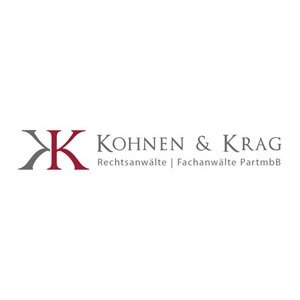Best Labor Law Lawyers in Germany
Share your needs with us, get contacted by law firms.
Free. Takes 2 min.
Or refine your search by selecting a city:
List of the best lawyers in Germany
About Labor Law in Germany
Labor Law in Germany, also known as Arbeitsrecht, governs the relationship between employees, employers, and trade unions. It encompasses a wide range of regulations from individual employment contracts to collective bargaining agreements. German Labor Law is designed to ensure fair treatment for employees while balancing the business interests of employers. The law covers various aspects such as working hours, protection against unfair dismissal, holiday entitlements, and workplace safety. It is heavily influenced by European Union directives, shaping a comprehensive framework that upholds the rights and duties of both employees and employers.
Why You May Need a Lawyer
There are several situations where seeking legal advice in the field of Labor Law may be necessary:
- Employment Contracts: Understanding the terms and conditions of your employment contract and ensuring they comply with statutory requirements.
- Unfair Dismissal: If you believe you have been unfairly dismissed, a lawyer can help you understand your rights and pursue compensation or reinstatement.
- Discrimination or Harassment: Legal assistance can be crucial if you face discrimination based on race, gender, religion, or other protected characteristics, as well as workplace harassment.
- Disputes over Wages or Benefits: If there are disputes regarding unpaid wages, overtime, or benefits, a lawyer can help resolve these issues.
- Collective Bargaining: Navigating negotiations or disputes related to collective bargaining agreements with trade unions might require legal expertise.
- Health and Safety Concerns: If workplace safety regulations are not being met, a lawyer can advise on the necessary legal actions or complaints.
Local Laws Overview
The German Labor Law landscape is characterized by several key aspects:
- Protection Against Unfair Dismissal: Employees have robust protection under the Employment Protection Act (Kündigungsschutzgesetz), especially in larger companies, where dismissals must be justified with valid reasons.
- Working Hours and Rest Periods: The Working Hours Act (Arbeitszeitgesetz) specifies a maximum of 48 working hours per week and mandates rest periods and a minimum of 24 consecutive hours of rest per week.
- Minimum Wage: German law mandates a federal minimum wage, which is periodically adjusted. As of recent updates, it's crucial to consult official resources for the current rate.
- Parental Leave and Benefits: Parents are entitled to parental leave (Elternzeit) and certain benefits, allowing them to take time off work to care for their child.
- Notice Periods: The Civil Code (Bürgerliches Gesetzbuch) outlines minimum notice periods for termination, which increase with the length of employment.
Frequently Asked Questions
1. What are my rights if I'm unfairly dismissed?
If you believe you have been unfairly dismissed, you may be entitled to file a claim for wrongful termination. The process typically involves submitting a complaint to the labor court, and it must be done within three weeks of receiving the termination notice.
2. Can my employer change the terms of my employment contract?
Changes to the terms of an employment contract generally require mutual consent. However, under specific circumstances, employers may propose changes. If contested, these changes may be subject to a court review for fairness and legality.
3. What is the legal procedure for collective redundancies?
In cases of collective redundancies, the employer must consult the works council and provide detailed information about the planned dismissals. A formal notification must also be given to the Federal Employment Agency.
4. How are working hours regulated?
According to the Working Hours Act, a maximum of 48 hours per week is allowed, with provisions for breaks. Exceptions and variations might apply depending on industry agreements or specific circumstances.
5. How is the minimum wage determined?
The minimum wage in Germany is determined by the Minimum Wage Act (Mindestlohngesetz) and is periodically reviewed. Employers must comply with the current legal minimum wage unless a higher rate applies through collective agreements.
6. What protections exist for freelance workers?
Freelancers are not generally covered by German Labor Law as traditional employees are. However, they still benefit from commercial laws and contract laws, as well as certain social security arrangements.
7. What steps should I take if facing workplace discrimination?
If you experience discrimination at work, it is recommended to first document the incidents, then seek advice from your works council or a legal expert. Formal complaints can be filed with appropriate authorities.
8. How is parental leave structured?
Parents are entitled to up to three years of parental leave per child, during which they may receive parental allowance. The leave can be taken by both parents, either simultaneously or sequentially, and is protected by law.
9. Can my employer require overtime work?
Overtime work should generally be agreed upon in the employment contract or through collective agreements. It should comply with applicable laws limiting weekly working hours.
10. What role does the works council play?
Works councils represent employee interests at the company level, dealing with issues like working conditions, dismissals, and workplace policies. They are essential in negotiating employment terms and resolving conflicts.
Additional Resources
For further information and support regarding Labor Law in Germany, consider the following resources:
- Federal Ministry of Labour and Social Affairs (BMAS): Offers comprehensive guidance on labor rights and regulations.
- Trade Unions: Organizations such as the German Trade Union Confederation (DGB) provide support and advice for employees.
- Works Council (Betriebsrat): Local representatives can offer immediate support and guidance within your company.
- Legal Protection Insurance: Some insurance options include coverage for legal disputes related to employment.
Next Steps
If you require legal assistance in Labor Law, here are some steps you can follow:
- Self-Evaluation: First assess the nature and urgency of the issue you are facing.
- Consult Resources: Review available information from governmental and union resources to gain a basic understanding of your rights.
- Seek Advice: Consider consulting with a works council representative or union advisor.
- Find Legal Expertise: If further assistance is needed, begin by looking for a qualified attorney specializing in Labor Law. Consider those with experience specific to your issue.
- Prepare Documentation: Gather all relevant contracts, correspondence, and documents related to your issue before meeting with a lawyer.
Lawzana helps you find the best lawyers and law firms in Germany through a curated and pre-screened list of qualified legal professionals. Our platform offers rankings and detailed profiles of attorneys and law firms, allowing you to compare based on practice areas, including Labor Law, experience, and client feedback.
Each profile includes a description of the firm's areas of practice, client reviews, team members and partners, year of establishment, spoken languages, office locations, contact information, social media presence, and any published articles or resources. Most firms on our platform speak English and are experienced in both local and international legal matters.
Get a quote from top-rated law firms in Germany — quickly, securely, and without unnecessary hassle.
Disclaimer:
The information provided on this page is for general informational purposes only and does not constitute legal advice. While we strive to ensure the accuracy and relevance of the content, legal information may change over time, and interpretations of the law can vary. You should always consult with a qualified legal professional for advice specific to your situation.
We disclaim all liability for actions taken or not taken based on the content of this page. If you believe any information is incorrect or outdated, please contact us, and we will review and update it where appropriate.
Browse labor law law firms by city in Germany
Refine your search by selecting a city.















